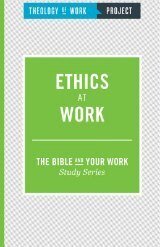Wanting More Power and Getting It
Blog / Produced by The High Calling
Have you ever had a conversation like this? "Hi. I’m Kevin."
"William. Nice to meet you, Kevin. Great conference, isn’t it?"
"So, William, what do you do for a living?”
I've had conversations like this. I've been Kevin and I've been William. My friend Rob Pepper would say, “The ‘What do you do’ question often means, ‘What is your title and do I need to listen to you?’”
By his own admission, Rob is a title guy, so it makes sense that he would translate the question in this way, even in jest. He does believe, though, that “leadership is purposeful influence, something you can’t do without some kind of power.” In a way, then, the title question matters, because with a title you have—to one degree or another—both power and influence.
Speaking of titles, Rob’s LinkedIn profile shows seven different titles since 1993, each building on the previous, and each containing the word “director.” If that were the measure of Rob’s depth, he wouldn’t be a young professionals coach at The High Calling, nor would he be where he is in his workplace. But he is where he is because Rob has been handed one promotion after another by people smart enough to recognize more than titles. Through diligence and the ability to “influence the culture of an entire organization, not just part of one,” Rob mixes work and faith in an inspiring way.
I wrote “ability to.” I could also have written “ambition to,” for Rob’s talent is simultaneously his obstacle; the Kryptonite to Superman’s potential undoing. He and I talked recently about power and power’s role in the integration of work and faith.
Five Types of Power
Power is a loaded term. In stories, we think of Darth Vader as having power and Luke Skywalker having none; the Evil Queen as having power and Snow White having none; Sauron as having power and Frodo having none.
Or so it appears. All of these characters have power, but the kind and use and timing of it differ greatly. According to social psychologists John French and Bertram Raven, there are five basic forms of power:
- Coercive, which forces others against their will.
- Reward, which offers or withholds what others want.
- Legitimate, which stems from position in relation to others.
- Referent, which comes from being liked.
- Expert, which shows up in the form of knowledge or information.
Darth Vader, for example, relied upon coercive power. Luke Skywalker, though he began weak, eventually acquired a mix of legitimate power as a Jedi and referent power from friends and allies. (One might argue that in the end his greatest source of referent power came from Darth Vader himself.)
Rob’s influence seems to come primarily from position, or legitimate power. He’s a director, both in title and personality. Even during his student teaching as an undergrad, his placement said, “Rob, you’re going to be a principal some day.” I asked him to be honest about what he does with this bent toward legitimate power.
“I want more of it.”
That’s the honesty I was looking for. Then he continued. “The truth is, I understand a lot about leadership and group dynamics, and I’m a make-it-happen kind of person. I want more of it because I believe I’m able to do something with it.”
It's Not about Me
Rob has a PhD in Organizational Leadership and spends a lot of his time putting this degree into practice. But he recognizes his limitations; his Kryptonite.
“Every time I walk into a meeting, I have to repeat to myself: It’s not about me, it’s not about me. I know that I’m not going to not influence, so I constantly have to check that my faith and my work are aligned. Am I, for example, pursuing the best interests of the organization? Jesus ‘made himself nothing by taking the very nature of a servant’ (Philippians 2:7). If I’m honest, I want to have that next title, but what I hope to be is someone who builds the Kingdom of God.”
I asked how he pursues this right thinking.
“When I was 24 or 25, I wanted to be the Director of Residence Life because I thought, I could do a better job than that guy. But I’ve never been promoted when I asked for a promotion. Other people knew I wasn’t ready even when I thought I was. Having a title is not negative, but when I’m not ready for it, that can be a problem.”
What Rob saw in himself 20 years ago came across loud and clear one day last summer. “I met with a recent grad—an international business major, with a leadership minor, too, I think. He was applying for organizational consultant jobs and I said, ‘You’re only 22! You haven’t even worked for an organization.’”
“Rob, at 43, do you think you’ve got this thing beat?” I wanted to know how much Bold Dreamer was still in him.
“No. And I prove it as a parent. Sometimes I use my position because I need to—like parents should, but sometimes I use it just because I’m power-hungry.”
Rob had mentioned his desire for more authenticity earlier in our conversation, and I could hear it in comments like this one. He went on. “I’ve always gotten caught up in positions and titles because I thought they would give me influence in the world. But the more I understand my identity in Christ, the less I think position is needed.”
“In this vein, what do you hope a young professional would learn from you over time?” I asked.
“Competency and character,” he said right away. “Our college believes, and I do, too, that people grow in their leadership and influence when both competency and character grow. If I can live like this, in an authentic way, maybe years from now that young professional would say, ‘Rob’s leadership helped me grow professionally and personally. He helped me lead like Jesus.’”
*****
My thanks to Rob Pepper. Read more about this series here:
- Four Obstacles that Threaten Every Good Endeavor
- The Businessman and the Fisherman
- Young Professionals Pick Freedom Over Money
- Wanting More Power and Getting It
- Powered by Wisdom: My Fall and Rise in the Classroom
- Insecurity at the Office
- The Danger of Securing My Future
- 'Twas the Eve of My First Job
Image by Rosana Prada. Used with permission. Sourced via Flickr. Post by Sam Van Eman, Young Professionals editor and narrator of A Beautiful Trench It Was.





